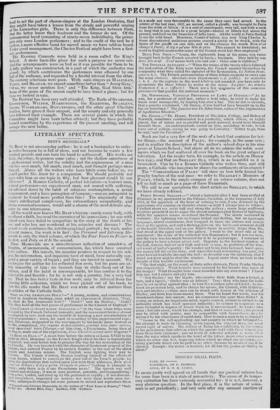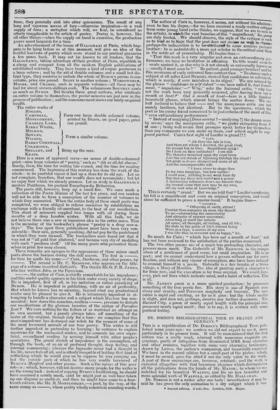MODERN SMALL POETS.
CAIN, BY GABRIELLE, BY C. REDDING. ADRA, BY G. P. R. JAMES.
IT seems pretty well agreed on all hands that our poetical volcano has for some time been in a state of non-activity. The cause of its tempo- rary extinction has been variously accounted for : it is not, however, a very abstruse question. In the first place, it is the nature of volca- noes to act periodically ; and very soon after any unusual exertion 'of
force, they generally sink into utter quiescence. The result of any long and vigorous access of fury—otherwise inspiration—is a vast supply of lava ; a metaphor which will, we fear, be considered as utterly inapplicable to the article of poetry. Poetry is, however, like all other things—when the supply on hand is excessive, the productive power must languish for a time. An advertisement of the house of GALIGNANI at Paris, which hap- pens to be lying before us at this moment, will give an idea of the fruitful harvests of poetry which were stored in our poetical granaries a few years back. It may not be known to all readers, that the GALIGNANIS, taking advantage of their position at Paris, republish in a cheap and compact form all the modern English publications of established celebrity. They have begun a kind of colpus poetarum in a large octavo ; and by the aid of double columns and a small but dis- I Met type, they contrive to include the whole of BYRON'S poems in one volume, price one pound. SCOTT is another volume ; WORDSWORTN, MOORE, and CRABBE, each in separate volumes—all these may be had for about sixteen shillings each. The voluminous SOUTHEY costs as much as BYRON. But besides these great authors, who vindicate an entire volume to themselves, the poet ea minores are just now in the process of publication ; and the announcement shows our lately-acquired wealth.
The entire works of ROGERS, CAMPBELL, MONTGOMERY, CHARLES LAMB, KIRKE WHITE, MILMAN, BOWLES, WILSON, BARRY CORNWALL,
COLERIDGE,
SHELLEY, and Bring up the rear. KEATS. 1 Form one large double columed volume, printed by DIDOT, on good paper, price . one pound. Form a similar volume.
Here is a mass of approved verse—an ocean of double-columned print—nine huge volumes of "poetry," each as " dik as all dat cheese." Surely, then, the time for writing has ceased, and the time for reading commenced. The beginning of this century has done the work of the whole : in its youthful vigour it laid up a store for its old age. Let us not complain, therefore, that our wealth does not accumulate ; but let us enjoy that which we already possess. Let us study in GALIGNANI'S modern Pantheon, his poetical Encyclopmdia Britannica. The poets still, however, keep up a small fire. We once made a collection of the Poetm Minimi of the last few years, and our readers will not be able to form a conception of the number of volumes to which they amounted. When the entire body of these small poets was completed, we were obliged to relieve ourselves by establishing an exchange with a friendly oil-merchant, to the best of our recollection. This shoal of minnows supplied two lamps with oil during three months of a deep London winter. With all this bulk, we do not believe there was a new or ingenious idea in the entire mass. This is the meaning of the bookseller's - phrase "poetry is a drug now-a- days." The loss upon these publications must have been very con- siderable: their sale, generally speaking, did not pay for the pasteboard in which they were incased. The booksellers soon found out that it was not at "all gold that glistered," and became very shy of meddling with such "perilous stuff." Of the many poets who presented them- selves in print few were chosen.
These remarks are apropos to the appearance of three minor small poets above the horizon during the dull season. The first is for thus he spells_ his name :—" Cain, Darkness, and other poems, by . The second is Mr. C. REDDING, who appears on the title- page of a volume inscribed Gabrielle. The thirdis Mr. G. P. R. JAMES, who has written Adra, or the Peruvians.
—, the author of Cain, is chiefly remarkable for his impudence; and this useful quality appears in his book under every variety of shape. He is impudent, first of all, in his imitation or rather parodying of BYRON. He is impudent in publishing, with an air of profundity, that which he knows has no meaning, beyond what any goodnatured reader may be pleased to give it. He is atrociously impudent in at- tempting to handle a character and it subject which MILTON has con- secrated: how dares this nameless, soulless presume to disturb our recollections of the glorious beauties of the author of Paradise Lost $P We care nothing for the failure of so wretched an attempt on its own account, but a parody always takes off something of the lustre of the original, though only for a time : we complain that this man's impudence has destroyed our relish for the moment of some of the most treasured morsels of our true poetry. This writer is still further impudent in pretending to learning : he ventures to explain mysteries for the unclassical reader, and he conceals his own super- ficial, secondhand reading by serving himself with other people's quotations. The grand stretch of impudence is the assumption, all through the book, of an air of profound thought, deep feeling, and internal communing; whereas the hypocrite never had a thought in his life, never feels at all, and is utterly incapable of holding that kind of selftasking which he would give us to suppose he was carrying on, but the outside garb of which he has very readily borrowed of ByucN's Mizzzfred and other poems. Such is the nature of this poor take-in ; which, however, will not deceive many people, for the writer is on the wrong tack : instead of copying Byamv's freethinking, he should have assumed a saintly mask, (and he might just as well have taken up one disguise as another), and then he might have come to a four- teenth edition, like Mr. R. MoNTGoatER-v,—a poet, by the way, of the same stamp as —, whose poetry wholly consists in sounding words. The author of Cain is, however, it seems, not without his admirers: even he has his dupes,—for we have received a ready-written critique from some young hand (who thinks, we suppose, that we are to seek in the article), in which the vast beauties of this "magnificent," &e. poem are duly lauded. We should observe, the style of the critique is such as to lead us to hope that the poet does not reviasv as walk as rhyme:, perhaps the indiscretion is to beatttributeetto some anxiOns younger brother: he is undoubtedly a more apt scholar in the critical cant than in the noble art of penmanship. He begins thus— "That this work is a very singular and even an extraordinary per- formance, we have no hesitation in affirming. Its title would seem to lerate against it, or else why is it not already so universally known as :..-3suredly it must soon be ? " Be patient, good younger brother! and let this assurance of early universal fame content thee. "To choose such a subject at all (after Lord BYRON), showed that confidence in self-talent, which, is rarely, if ever mistaken in its object." We are amused by the phrase " confidence in self-talent"—we have called it, tout bonne- ment, "impudence."—" Why," asks the fraternal critic, "why has not the work been very generally reviewed, (per having been out a month at least 1' Out a month at least—here is a little familiar household phrase, which almost brings the matter home. We are half inclined to believe that — and the anonymous critic are not merely brethren, but identical. But to the specimens, which the poet or his young friend conceived to be just criteria of the merit of this "even extraordinary performance." " Instead of analysing [Deus avertat f—analysing !] the drama scene by scene," says the anonymous critic, "we prefer extracting from it at onc:.. ; being well aware that passages speak better for themselves than any comments we can make on them, and which might be sup- posed partial. Cain's first sight of Lucifer is grand !! !
" CAIN.
" Ah then the tale is true, And thou art whom I doubted, the great rival,
Or second but to ONE. Magnificent spirii !
Do I look on thee unblasted ? I see still The thunder trenched upon thy regal brow Like the red streak of lightning throtigh the cloud !
Yet pride is deeper stamped and scorn of all And the unconquerable will.
" I have strove to shape thee In my vain imagings, but how unlike !
I could now, yielding to my weak fears fly But that my knees feel rooted and a power A fascinating influence draws me towards. thee An inward sense that now may be my own, All my soul asks of knowledge."
This is certainly "grand." But we are told that" Lucifer's confessin his fall is a magnificent and even an original conception, and would alone be sufficient to prove a master-hand." It begins thus- " LUCIFER.
"Offspring of earth, attend ! Couldst thou compare an atom like thyself To me—abstracting the immortality And ubiquity of essence uncreated; Absorbing in itself the infinite All space, all thought, all feeling, and all life ; My state in the grade of life's eternal being Were as a type, a mirror of my own I was like thee as reverent and as happy," &c.
So much for Cain; "which has been out a month at least," and has not been reviewed to the satisfaction of the parties concerned. The two other poems are of a much less pretending character, and possess more merit. The Gabrielle of Mr. REDDING is the compo- sition of a gentleman of good sense, but small inspiration. He is no poet ; and we cannot understand how a person without ear for versi- fication, and without any vigour of conception, can have been induced to commit himself in a poem. Gabrielle is a fair lunatic of a Swiss village, a Mary of Moulins. The idea of painting such a character is far from new, and the execution is far from original. We could, how- ever, pick out lines which indicate mind, and a habit of reflection. This is all.
Mr. JAMES'S poem is a more spirited production : he possesses something of the true poetic fire. His story is one of Spanish trea- chery and cruelty, and Peruvian simplicity and bravery. The nar- rative is rapid and exciting, as far as it goes : but the whole matter is slight, and does not, perhaps, deserve any further discussion. The Ruined City, a poem of nearly equal length with the principal onc, possesses nearly equal merit ; that is to say, it is written with some poetical feeling. •



















 Previous page
Previous page